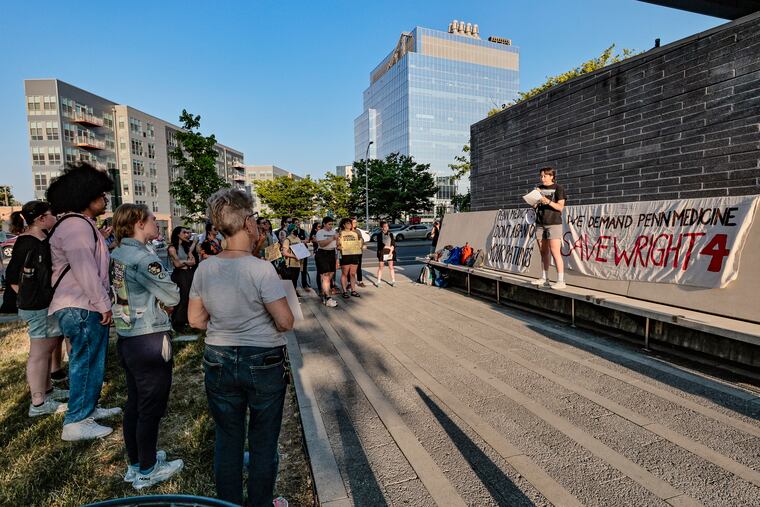Penn is closing an inpatient addiction treatment program that advocates say homeless patients rely on for care
Advocates for people who use drugs say they're concerned for people without housing who rely on longer-term inpatient treatment to stabilize themselves while recovering from an addiction.

Saying that Penn Medicine is not prioritizing care for opioid addiction at a time of soaring overdose deaths, several dozen protesters chanted “patients over profits” to protest the closure of a West Philadelphia addiction treatment unit at a rally last week.
The protest urged Penn to keep open Wright 4, an 18-bed addiction treatment unit at Penn Presbyterian Medical Center.
The ward will shut down entirely next month, after all current patients have completed the maximum 30-day stay there. In its place, Penn plans to offer 16 inpatient addiction treatment beds between Hospital of the University of Pennsylvania — Cedar Avenue, located about two miles west of Presbyterian, and Pennsylvania Hospital in Center City. The move is part of a consolidation of the system’s mental health crisis services at HUP Cedar and Pennsylvania Hospital.
But some protesters, including some who work in the Penn health system, say that Penn hasn’t provided enough information about how treatment will be delivered at the new locations, and that they’re concerned for people without housing for whom inpatient treatment was particularly helpful.
For the last two years, HUP Cedar has maintained 16 “detox” beds for five-day placements that shepherd someone with addiction through the early days of withdrawal.
But simply undergoing detox for a few days isn’t enough time for most patients to stabilize, protesters said. They said they feel Penn hasn’t been clear about when longer-term inpatient beds will open and whether patients can expect the same kind of longer-term care as they received on Wright 4.
In a statement, Penn Medicine’s vice president for public affairs, Patrick Norton, said that the health system will transfer its inpatient drug and alcohol services from Presbyterian to HUP Cedar on July 1 without providing further details.
Norton said that standards of care around substance use treatment have changed in recent years: “For instance, some substance use treatment which was previously delivered in an inpatient setting is now provided through intensive outpatient programs.”
Penn Presbyterian will continue to offer outpatient treatment, Norton said, and has doubled its number of outpatient substance use disorder counselors. Norton noted they will also connect patients who need inpatient care with other facilities that do offer it. Penn officials have also offered to meet with protesters about the unit’s closure.
City officials said that they do not anticipate that patients will have difficulty accessing inpatient beds after Wright 4′s closure. The city “has maintained “good capacity and flow in the substance use disorder treatment system,” said Rhashidah Perry-Jones, the senior director of communication for Community Behavioral Health, the city entity that oversees programs like Wright 4 that accept government-funded health insurance.
‘We won’t go lightly’
At Thursday’s protest, speakers contended that for people without housing, inpatient care is crucial to help them stabilize while recovering from addiction. (Penn recently announced it is participating in a new initiative with Project HOME to offer immediate housing to homeless patients with addiction.)
“A 30-day stay is vital, especially for people who are unhoused,” said Kelsey Leon, a research coordinator in Penn’s emergency department. Leon is also involved with the Community Action Relief Project, a harm-reduction group based in Kensington, which helped to organize last week’s protest. “It’s important just to be able to have a space to reacclimate with how your body is feeling.”
Wright 4 has built a reputation among people with addiction as a safe, welcoming place to recover, advocates said. They said they feared that reputation would be lost with the unit’s closure.
“[Penn] is compromising this unattainable golden nugget — trust, from people who have no reason to trust anyone,” said Billy Ray Boyer, a organizer with SOL Collective, another harm-reduction group that organized Thursday’s protest.
A Penn spokesperson said that staff from Wright 4 would transfer to HUP Cedar, “ensuring that the welcoming culture patients have come to expect remains in place.”
In a news release, Penn officials said that the addiction treatment beds on Wright 4 will be converted to medical-surgical beds to shorten emergency room wait times and provide more beds for patients recovering from surgery.
Leon and other advocates called the plan “a money move” that doesn’t prioritize some of the city’s most vulnerable patients: Lower income people with addiction who rely on the government’s Medicaid health care program to pay for treatment. Those programs often reimburse hospitals for health-care costs at a lower rate than private insurance. Penn officials did not respond to a question about that characterization.
At Thursday’s protest, advocates called on Penn to keep Wright 4 open and to expand their addiction treatment offerings across the health system, including opening more inpatient beds. They also want the hospitals to offer methadone treatment for inpatient addiction patients.
“We want to deliver a really strong message about who will be impacted by this closure, and we won’t go lightly. This is not a one-off protest for us — we will be back in many different ways,” Boyer said.